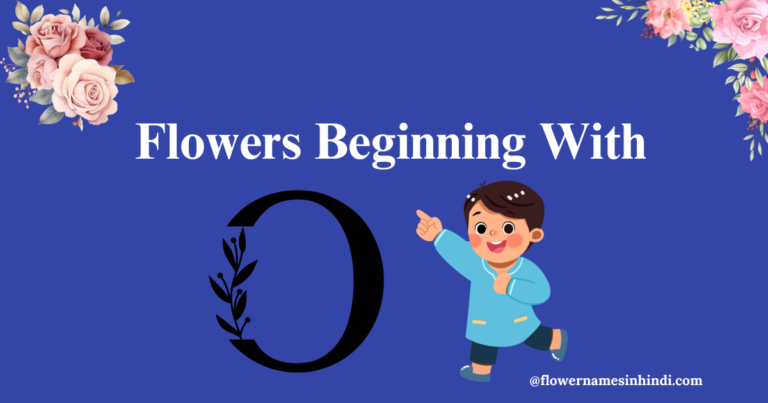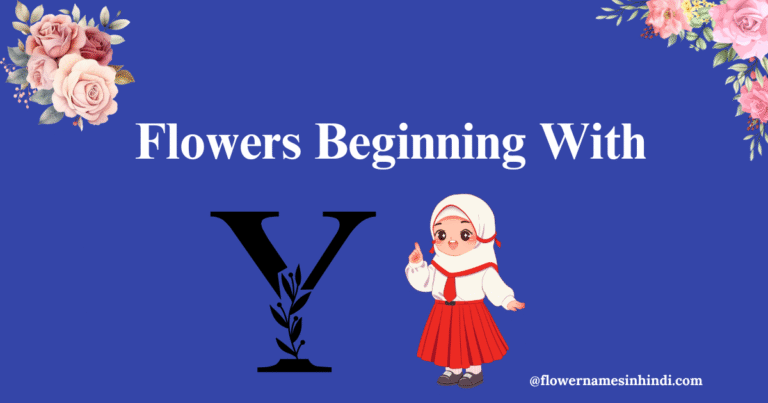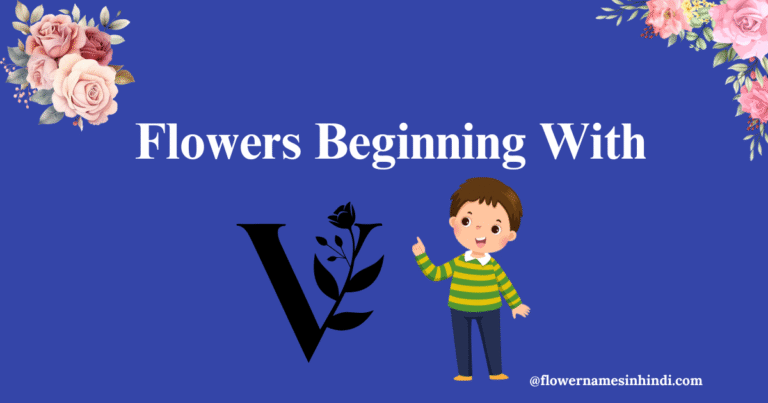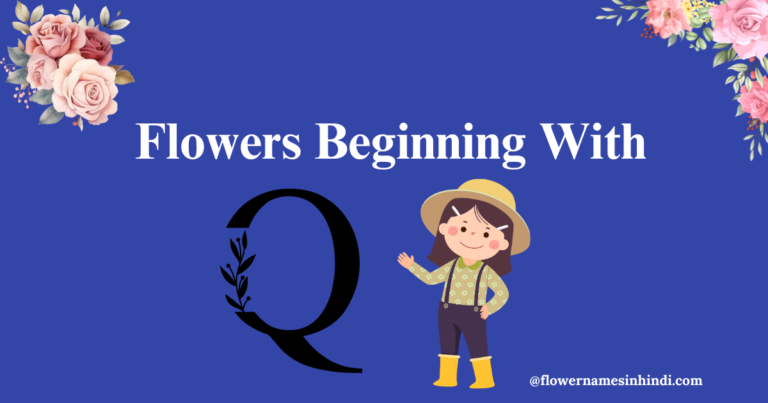13+ Loving Flowers That Start With L | HD Images
Finding a new flower always feels magical. Last month, while walking on a nearby street, I saw a bloom I had never noticed before.
After some research, I learned it was Lisianthus. Its soft, rose-like petals carried a charm of their own. That moment inspired me to explore more flowers that start with the letter L.
Love discovering flowers by alphabet? Don’t miss our recent blogs on flower starting with I, J, and K, each one has something special to offer!
Lily

Lily or Lilium is a herbaceous flowering plant, belonging to the Liliaceae family. Many other plants have the word “lily” in their common names, but they are not from the same genus. The genus Lilium does not include plants such as calla lilies, water lilies, or daylilies.
Despite their beauty, lilies are extremely toxic to cats. Keep leaves and pollen out of your feline pals’ grasp because even tiny amounts might result in kidney failure. They need extra sunlight for popper growth, so make sure to provide them frequently.
In Greek mythology, it was thought that Hera, the queen of the gods, was the source of lilies. Christians later connected white lilies, also known as Madonna Lilies, to the purity of the Virgin Mary, while Romans connected them to Venus, the goddess of love.
| Scientific Name | Lilium |
| Blooming Time | Mid to late spring |
| Symbolism | Purity and Beauty |
| Number of Species | More than 100 Species |
| Native To | Temperate region of Nothern Hemisphere |
Lupine | Flowers Beginning With L
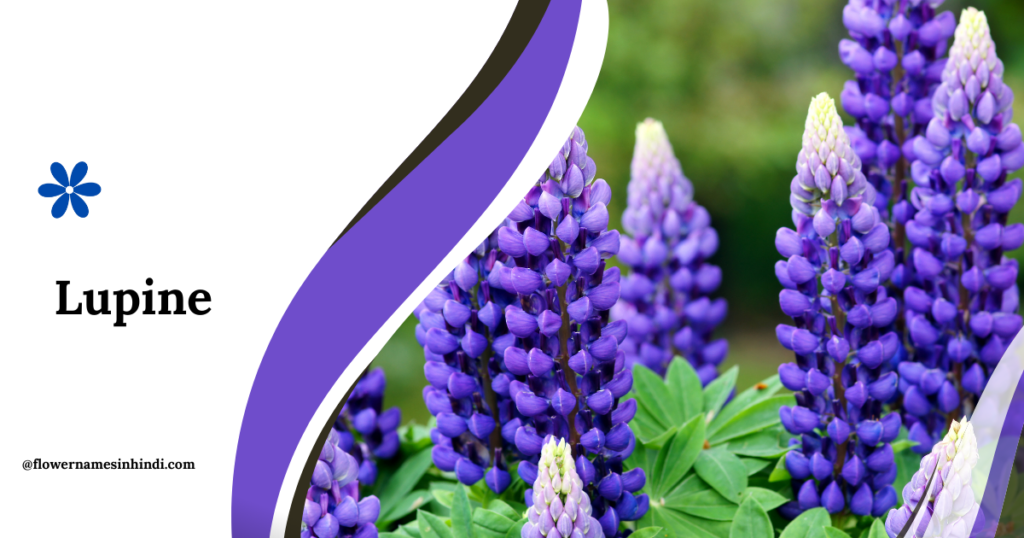
Lupine or Bluebonnet is a beautiful wildflower, belonging legume family Fabaceae. Lupines have a natural soil-enhancing effect. They possess a unique capacity to transform atmospheric nitrogen into a form that improves soil quality and aids in the growth of other plants.
Lupines grow in full sun, requiring at least six hours of direct sunlight will be enough. Although they can tolerate some shade, their flowering process will be reduced, which you do want, right?
These flowers are available in a variety of colors, including blue, purple, pink, yellow, and white, and can form lovely wildflower fields.
| Scientific Name | Lupinus |
| Blooming Time | Late spring to early |
| Symbolism | Imagination and Admiration |
| Number of Species | Approximately 267 Species |
| Native To | North and South America |
Lavender | Flowers That Start With L
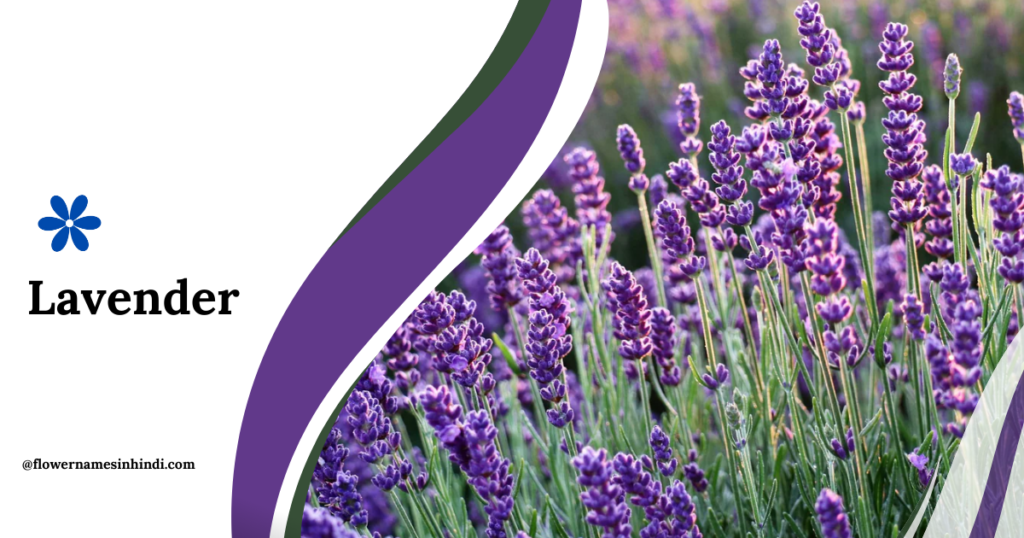
Lavandula or lavender is basically a perennial flowering plant of the mint family. The word “lavender” was originally derived from the Latin word “lavare,” meaning “to wash.” Romans used lavender to add extra aroma to their baths, clothes, and even hair. It was one of the first “laundry fresheners” in history.
Lavender includes an oil that appears to have relaxing properties and may relax specific muscles. Additionally, it appears to have antifungal and antibacterial properties.
Lavender is one of the oldest scents used in England, and Queen Elizabeth I used it to alleviate migraines in addition to as a perfume. She drank lavender tea daily and even demanded that fresh lavender flowers be available in her palace at all times.
| Scientific Name | Lavandula angustifolia |
| Blooming Time | Late spring to early summer |
| Symbolism | Purity and Calmness |
| Number of Species | 47 Species |
| Native To | Mediterranean region |
Lisianthus

Eustoma, often known as lisianthus or prairie gentian. It is frequently mistaken for roses or peonies because of its delicate and ruffled petals. However, it is actually a member of a completely different plant family, gentian.
Growing Lisianthus from seed can take up to 5 months before blooming, but believe me, the rewards are magnificent, long-lasting flowers. They prefer bright, direct sunlight (at least 6–8 hours per day). It can become weaker and yield fewer flowers if it does not get enough sunlight. Surprisingly, they have no smell.
| Scientific Name | Eustoma grandiflorum |
| Blooming Time | Summer |
| Symbolism | Appreciation |
| Number of Species | 3 Species |
| Native To | Southern United States and Mexico |
Lotus

It is one of my all-time favorite flowers. On my last birthday, Anaya, my best friend surprised me with a bouquet of lotuses, making the day even more beautiful. It is truly exceptional due to its durability, profound meaning, and elegant beauty.
The lotus, which belongs to the Nelumbonaceae family, is famed for its ability to emerge from dirty waters and develop in incredible perfection.
Lotuses grow best in ponds or shallow water containers and require full sun, warm water (above 75°F or 24°C), and nutrient-rich clay. In many cultures, particularly Buddhism and Hinduism, it is revered as a symbol of spiritual enlightenment and divine beauty.
Lotus leaves feature a unique superhydrophobic surface, which naturally repels water and dirt. This is due to small microscopic ridges on their surface that prevent water droplets from spreading, prompting them to roll away and carry any dirt with them.
| Scientific Name | Nelumbo nucifera |
| Blooming Time | Summer |
| Symbolism | Rebirth and Enlightenment |
| Number of Species | 2 Species |
| Native To | Tropical region of Asia |
Lantana | Flowers That Start With L

These are well-known for their colorful and fragrant flower clusters, which frequently display various colors within one cluster. Interestingly, the flowers change color as they age, creating a vibrant and colorful illusion, you will love the scene for sure.
It is poisonous to both humans and many animals, by the way. The leaves and unripe berries contain poisons that, if taken in sufficient quantities, can be dangerous to livestock and pets. When crushed, their leaves emit a pungent aroma that deters mosquitos and other insects.
| Scientific Name | Lantana camara |
| Blooming Time | Spring to fall |
| Symbolism | Liveliness |
| Number of Species | 150 Species |
| Native To | Tropical region of America |
Love-in-a-Mist
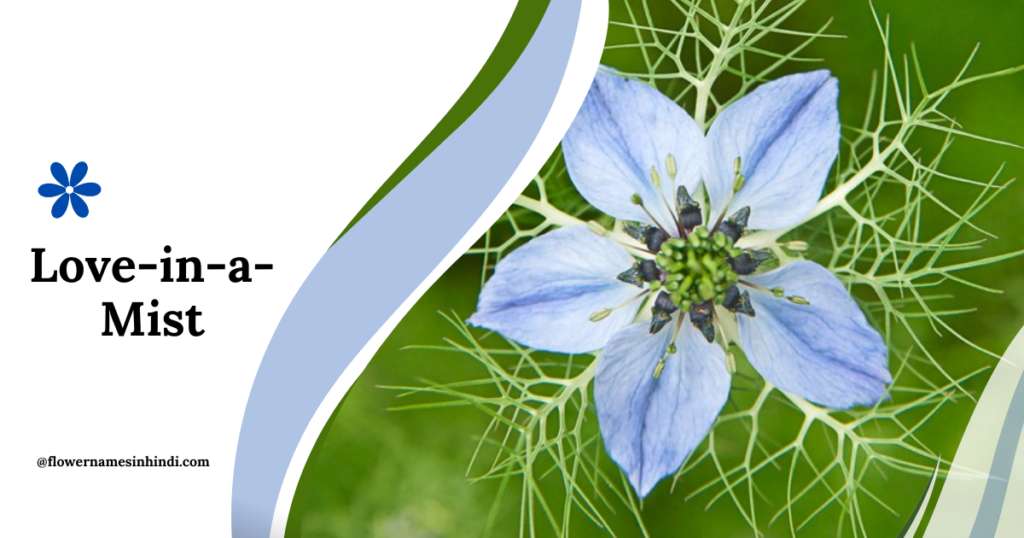
Nigella damascena, also referred to as love-in-a-mist or devil in the bush, is an annual ornamental flowering plant belonging to the the Ranunculaceae buttercup family.
It creates an excellent cut flower, and the eye-catching seed capsules are frequently used in both fresh and dried floral arrangements. Once planted, this flower self-seeds, which means it will return year after year without needing to be replanted.
Love-in-a-Mist has been cultivated since at least the 16th century and was a favorite among cottage gardens in England and Europe. It was often gifted as a symbol of love and tangled emotions.
| Scientific Name | Nigella damascena |
| Blooming Time | Summer |
| Symbolism | Delicacy |
| Number of Species | 15 Species |
| Native To | Southern Europe, and North Africa, |
Lobelia | Flowers Beginning With L
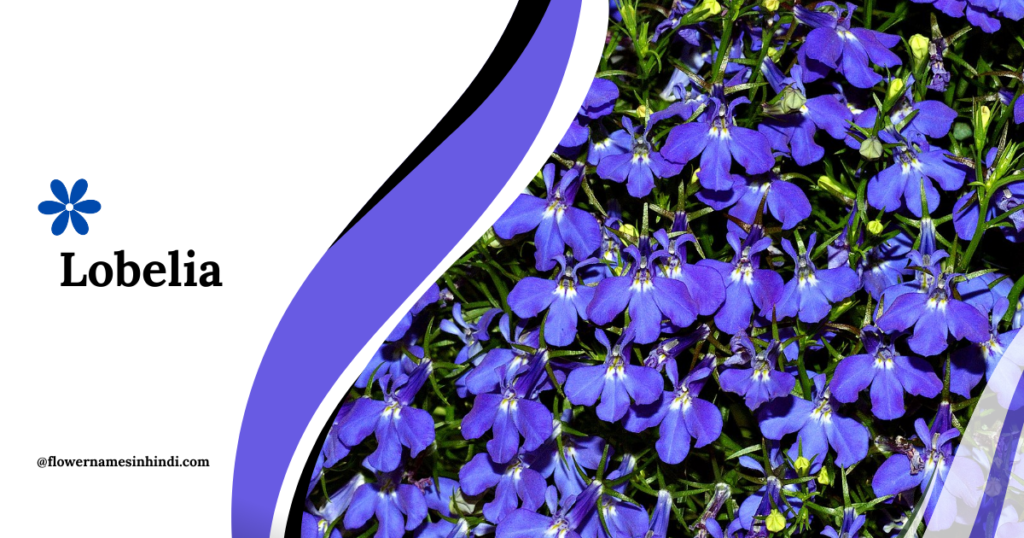
Lobelia is a genus of flowering plants, some of which have been used in herbal medicine for centuries. In general, they are referred to as lobelias.
Lobelia inflata is still utilized for medicinal purposes. According to studies, lobeline, the major active component, may guard against depression. It may also help in the treatment of drug addiction, and increase memory and focus.
They prefer moist, well-drained soils and can grow in either full sun or light shade, depending on the species. While some kinds may tolerate high temperatures, many prefer milder weather, especially during blooming. It is a toxic herb.
| Scientific Name | Lobelia |
| Blooming Time | Summer to fall |
| Symbolism | Distinction and Luck |
| Number of Species | 415-440 Species |
| Native To | Worldwide |
Lamb’s Ear

Lamb’s ear is a popular silver-leaved herbaceous perennial ground cover belonging to the Lamiaceae or mint family. It derives its name from its soft, fuzzy leaves, which feel just like a real lamb’s ear.
This velvety texture is caused by microscopic, thin hairs that help in moisture retention and protect the flower from direct sunlight. They can easily grow in rocky, poor soils with minimal water.
By the way, they have been used for centuries in herbal therapy to treat sore throats, fevers, and digestive problems. However, they were also used to make herbal drinks because of their reputed soothing and anti-inflammatory properties.
| Scientific Name | Stachys byzantina |
| Blooming Time | Late spring got early summer |
| Symbolism | Softness and Protection |
| Number of Species | 300 Species |
| Native To | Turkey, Iran, and America |
Lunaria | Flowers That Start With L
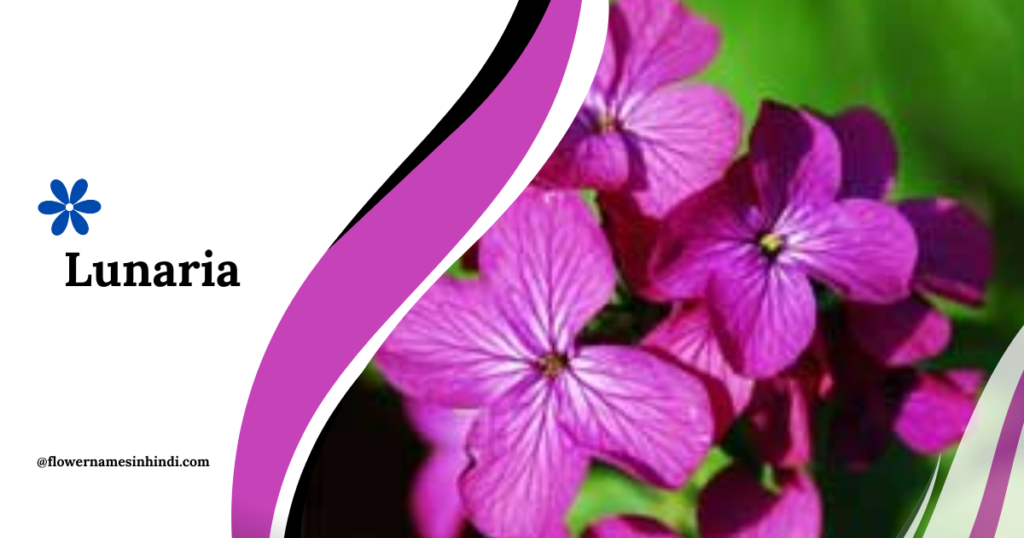
Lunaria is a flowering plant genus that belongs to the Brassicaceae family. It is derived from the Latin, meaning “moon-like” and describes the ornamental seedpods of the plants. In flower language, the plant stands for honesty, money, and sincerity.
Silver dollar, dollar plant, money plant, moonwort, and honesty are other common names for Lunaria annua. However, it is non-toxic. Lunaria is easy to grow and requires little maintenance. It is commonly used as a border plant and a naturalizer in woodland environments.
| Scientific Name | Lunaria annua |
| Blooming Time | Spring to Early Summer |
| Symbolism | 4 species |
| Number of Species | Honesty, prosperity, and sincerity |
| Native To | Europe, Western Asia |
Lewisia

The Lewisia flower is named after Meriwether Lewis, a well-known American explorer from the Lewis & Clark Expedition. He noticed this lovely wildflower while traveling across North America. This flower belongs to the “Montiaceae” family.
Lewisia roots were used by Native American tribes, particularly the Shoshone, as food. It grows well in well-drained and dry soil.
| Scientific Name | Lewisia |
| Blooming Time | Spring to Summer |
| Symbolism | Perseverance and resilience |
| Number of Species | 19 species |
| Native To | Western North America |
Lithodora

This low-growing, evergreen shrub belongs to the Boraginaceae family and is native to southwestern Europe, southern Greece, Turkey, and Algeria. Its bright blue or white blossoms resemble tiny stars spread on a rich green carpet, I loved them.
They grow in acidic, well-drained soil, and are low maintenance. While they do not like to be moved it’s preferable to plant it in an area where it will grow freely for many years.
The name Lithodora comes from Greek: “lithos” (stone) and “dorea” (gift), meaning “gift of the stone,” referring to its love for rocky soils and dry landscapes.
| Scientific Name | Lithodora diffusa |
| Blooming Time | Late Spring to Summer |
| Symbolism | Love, devotion, and gift |
| Number of Species | Approximately 9 species |
| Native To | Mediterranean Region |
Larkspur

Larkspur is a perennial or annual flowering plant that belongs to the Ranunculaceae family. The name “Larkspur” is derived from the shape of the petals, which look like the spur of a lark’s foot. Even though they are typically annuals, they frequently self-seed, which means they can come back year after year without extra care.
It is one of July’s natal flowers and represents strong love, positivity, and an open heart. Larkspur flowers were traditionally used to make blue and purple dyes, which added a natural pop of colour to fabrics and crafts.
In ancient times, Larkspur was used to ward off scorpions, snakes, and evil spirits. People even sprinkled its petals around their homes for protection.
| Scientific Name | Delphinium |
| Blooming Time | Early to mid-summer |
| Symbolism | Strong bonds of love, open heart |
| Number of Species | 365 species |
| Native To | Northern Hemisphere |
Lisianthus | Flowers That Start With The Letter L

Lisianthus commonly known as “Eustoma” and “Prairie gentian”. It is a delicate and small genus in the Gentianaceae family. They look like roses but they are not true roses. They can last up to 2-3 weeks in a vase. Lisianthus is known for being one of the most challenging flowers to grow from seeds.
It requires patience, specific temperature conditions, and months to bloom. Lisianthus comes in yellow, green, and even bi-colored variants, however, it is most frequently found in purple, pink, and white hues.
| Scientific Name | Eustoma |
| Blooming Time | Summer to Fall |
| Symbolism | Gratitude, charisma, and appreciation |
| Number of Species | 3 species |
| Native To | Southern U.S., Mexico, South America |
Wrap Up | Flowers Starting With Letter L
Whenever I see a flower, I feel excited to learn its name, meaning, and story, because every bloom has something unique to share. That is why I enjoyed exploring flowers that start with L, from the bright Larkspur to the soft Lisianthus.
If you are also curious about L flowers, I hope this list gave you some new favorites. Want to keep exploring more blooms?
Check out our collection of flower names in Hindi, where every bloom comes with its own meaning and charm.



